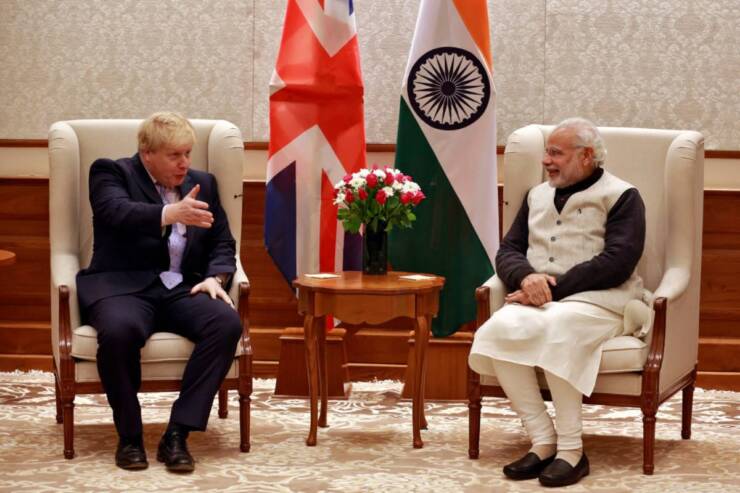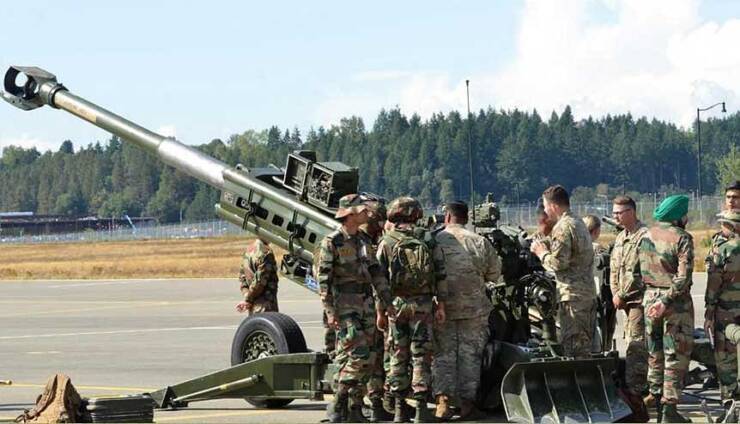
India and UK are currently enjoying strong friendly ties and the May 4 Virtual Summit of Prime Minister Narendra Modi with his British counterpart Boris Johnson led to the adoption of an ambitious ‘Roadmap 2030’ to boost bilateral ties specially in defence cooperation to a ‘Comprehensive Strategic Partnership’. The Roadmap paves the way for a deeper and stronger engagement over the next ten years in key areas including defence.
The two leaders vowed to expand bilateral defence cooperation, including through technology collaboration in developing combat aircraft and complex weapons. They also agreed to increase maritime co-operation with India inviting the UK’s liaison officer to the Indian Navy’s information fusion centre, a key facility that keeps a hawk-eyed vigil on developments and movement of ships in the Indian Ocean region. The maritime cooperation between the two countries assumes significance in the wake of China’s rapidly growing PLA Navy and the establishment of bases in Africa.
Despite the cancellation of Johnson’s trip to India owing to the worsening COVID-19 pandemic, London and New Delhi’s advance toward a closer and more meaningful partnership is unlikely to dampen. What adds significance towards strengthening defence relationship between the two countries, is UK’s declaration that it will “pursue deeper engagement in the Indo-Pacific” and sees India as a “key pillar” in this endeavour. India, too, has been keen to shore up support from like-minded countries to safeguard its national interests and bolster its territorial and regional security. Ironically, Britain was a country which at one time was said to “rule the waves.”
This has led to India formalizing defence agreements, participating in joint military exercises, and striving to modernize its military through numerous means. Hence, the UK’s foray into the Indo-Pacific is sure to be warmly welcomed by India. And while it is too early and strategically unwise for either side to publish the specifics of how this mutually beneficial partnership will unfold, history and contemporary events provide an excellent perspective to gauge where they are headed.
With both countries globalising while being mindful of rapidly changing geo-political equations and economic challenges that temper their ambitions, the defence cooperation would bring them closer. While strategic relationship is built on shared foreign policy goals as well as economic partnerships but in the areas of defence risk perceptions and of military technologies, these lend themselves to a natural synergy between India and the UK.
Despite the UK accounting for 16 per cent of global defence sales, its share of the Indian defence market has steadily tumbled over the decades to around two per cent. The UK recently published the outcomes of the Integrated Review (IR) of security, defence, development and foreign policy titled ‘Global Britain in the Competitive Age’ that describes the UK government’s vision for the UK’s role in the world over the next decade.
The review clearly enunciates a tilt towards the Indo-Pacific region with the goal of “strengthening defence and security cooperation, including in maritime security, building on our overseas military bases and existing contribution in the Indo-Pacific”. The review focuses on the UK-India relationship, recognising the existing strength of the relationship and clearly envisioning a desire for, what Prime Minister Modi recently described as “quantum leap” in the relationship.
Most importantly, there is a strong convergence of strategic vision between the two countries and no unresolved disputes that could become deal breakers in future. UK and Indian companies, as highlighted in India Global Business’s recently concluded ‘Defence Boardroom’ meeting, are ready to take this relationship to the next level in defence cooperation – and step up the engagement from ‘Make in India’ to ‘Co-create in India’.

As India embarks on the path of self-reliance in defence production, in line with the vision of Prime Minister Modi, it is expected that UK would be a partner ready, willing and able to collaborate in the transformation of India’s defence sector. The UK, as a leading nation in defence systems, has a track record of partnerships that goes beyond physical assets and includes embracing technology sharing and security partnerships.
Britain’s defence equipment makers can become partners of choice for both the public sector as well as the private sector in India for co-creating and co-developing technologies for the Indian armed forces as well as for exports to friendly nations.
However, for this the two nations must work together to develop new intellectual and ground-breaking property that will enable both countries to strengthen their positions in the global defence production value chain. There will be scope to leverage India’s globally admired frugal engineering capabilities and the power of the new IP, the two nations can jointly develop to produce military equipment as well as related software and services. Not only will this help create thousands of new jobs for highly skilled workforces in both countries, but it will also generate immense skilling and re-skilling opportunities in the local supply chain eco-system that such a defence manufacturing environment will inevitably foster.
With India having two defence corridors – Uttar Pradesh and Tamil Nadu – tie ups with British defence companies would give an immense boost to indigenous defence companies. Defence analysts see tremendous synergies between the needs and capabilities of both countries by building on the foundations of the centuries-old relationship between the two countries. The time has truly come for India to make that “quantum leap” that both Prime Ministers will strive for in the coming days.
With the UK expanding its footprint in the Indo-Pacific and India working toward gaining prominence as the net security provider in the region, both countries’ aspirations and future seem to be intertwined. An area of focus up ahead should be to enhance military-to-military interactions. India and the UK have not conducted more complex tri-service exercises either, nor have they taken part in trilateral or multilateral exercises with other partner countries.
The UK, with its bases in Kenya, Brunei, Bahrain, Oman, Singapore, and the British Indian Ocean Territory, is by no means new to the region. Having such an infrastructure already in place will not only aid its ambitions in the region but also be valuable to its partners. For India, access to these bases will augment its reach further into the Indian Ocean. Working with other like-minded countries, such as Japan and Australia, there is great scope for close cooperation in areas of maritime domain awareness and intelligence sharing by leveraging the strength of each other’s assets. In this regard, Japan’s initiative to enhance defence intelligence sharing with India, Australia, and the UK is a significant step.
The deployment of HMS Queen Elizabeth carrier strike group across the Mediterranean, the Middle East, and the Indo-Pacific brings with it yet another opportunity. And although the recently released Integrated Review of Security, Defence, Development and Foreign Policy specifically calls for showcasing the strike group’s interoperability with the US, a similar or joint demonstration should take place with India, which is a regional power with experience of operating carrier battle groups.
Moving forward, the India-UK defence relationship will no longer be limited to being one of a buyer-seller. It will not stop at defence production either. Through close maritime cooperation and a joint approach toward maintaining regional security and stability in the Indo-Pacific, the two countries have the potential to forge a truly comprehensive strategic partnership in action.
-The writer is Consulting Editor with the publication.








